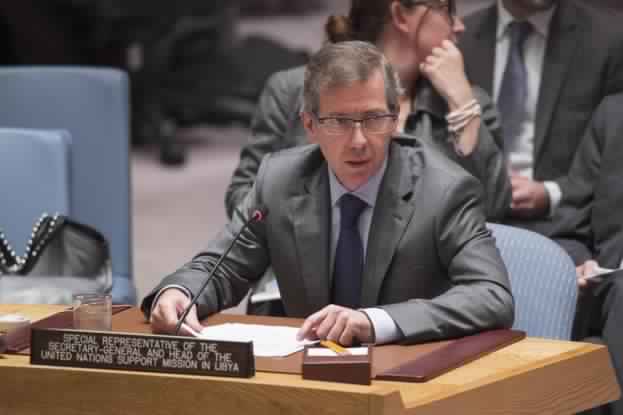By Libya Herald staff.

Tunis, 5 November 2015:
In a last report to the UN Security Council (SC) as Special Envoy to Libya, . . .[restrict]Bernardino Leon today accused the heads of the both the House of Representatives (HoR) in Tobruk and the General National Congress (GNC) in Tripoli of deliberately preventing members of both bodies from voting on the Libya Dialogue agreement and the appointment of a Government of National Accord. The majority in both places were in favour of the deal, he said. At a press conference afterwards, he claimed that a majority, first of the GNC then of the HoR, had actually endorsed the agreement.
There was no mention in his SC statement, however, of the bombshell that exploded under the Dialogue agreement yesterday with the news that he has been appointed as first director of the UAE’s Diplomatic Academy. According to a report in the Guardian newspaper in London, he was negotiating the more than $50,000-a-month job throughout the summer with the Emiratis. With them resolutely backing the HoR and accused by the Tripoli regime of actively supporting it militarily, Leon’s impartiality as chief international mediator in the Libya crisis is now seen as irreparably damaged – although, ironically, one of the main accusations against him until now has been that he favoured the Muslim Brotherhood and the regime in Tripoli.
The Guardian report has Leon claiming in an email on 31 December 2014 to UAE foreign minister Sheikh Abdullah bin Zayed that his aim was to strengthen the HoR and “break a very dangerous alliance” between the Misratans and Islamists that has been the lifeblood of the GNC. The report also has him claiming to have “a strategy to ‘completely delegitimise’ the GNC” and supposedly admitting to have consulted at every step with the HoR, the Libyan Ambassador to the UAE Aref Nayed and former Libyan prime minister Mahmud Jibril, who is now based in the UAE.
The UAE appointment and the Guardian allegations have shocked Libyans on both sides of the divide. In a letter of complaint to UN Secretary General Ban Ki-moon, the president of the GNC, Nuri Abu Sahmain, said the appointment raised serious suspicions about Leon, threatened to the political process and casts doubts about the role of UN Support Mission in Libya (UNSMIL).
“The timing of this appointment, when Libyans are asked to accept and approve this mediator’s proposals, represents a disregard for the Libyan people’s blood and their sacrifices during the 17 February revolution,” he wrote.
His deputy, Awad Abdul Saddeq, told Reuters that, as a result, the almost year-long UN–brokered negotiations would have to start all over again.
“The replacement of Leon should start all over again, now we know Leon was biased in favor of one of the sides,” he was quoted as saying.
In the east, where it has been reported that 91 members of the HoR had agreed to vote on Monday in favour of the GNA and the Dialogue agreement with its latest proposals of nine Presidency Council, it is now said that there is no chance of any such vote.
Abu Sahmain’s claim that not just Leon but the entire UN mission in Libya is now suspect is being repeated by other Libyans. “He has done immense damage to both UNSMIL and the international community,” the Libya Herald was told by one top official in Tripoli who asked not to be named but who has long made clear his antipathy towards the GNC and support of the HoR.
There are indications that the UN Secretary General understands this, although at the press conference Leon that he had followed UN procedures over the new job and that no one had at any point concerns.
Yesterday, in a statement formally announcing the already widely-known news that German diplomat Martin Kobler is to take over from Leon as UN Special Envoy to Libya, there was the most cursory reference to Leon.
Kobler is expected to start taking over this weekend.
In his statement to the Security Council, though, there was no acknowledgement at all of the damage his UAE job announcement and the Guardian report have done to Dialogue efforts or the UN’s credibility in Libya. Leon confidently predicted that while “the next few days will be critical to Libya’s future” the UN would will continue to encourage the HoR and GNC to endorse agreement and “continue working with the moderate voices from the different dialogue tracks as well as from across Libya’s political and civil society spectrum, as well as those among security actors, for the sake of forging a viable way forward”.
Responding to journalists’ questions about the job and the report following his Security Council address, Leon insisted the momentum behind the Dialogue was not lost even though those behind hacking and leaking his emails were intent of undermining the process. He denied that there was any conflict of interest in taking a job with the UAE authorities although he admitted that maybe he could have done things in a different way and that the appearances might not be good.
As to Abu Sahmain’s complaint, he said that the GNC president was himself “a problem” by trying to delay a political solution and preventing the GNC from voting [/restrict]








